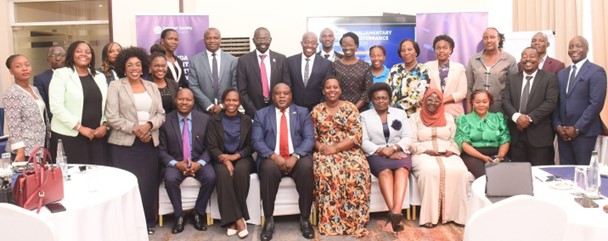- August 29, 2024
- Posted by: Joseph Kiwendo
- Category: Blog, Events, News

By Maureen Agena|
Investing in policy development is crucial to ensure informed legislation and the effective implementation of reforms. Indeed, international bodies and forums, including the UN General Assembly, the global Internet Governance Forum (IGF), and the World Summit on the Information Society (WSIS), consistently emphasise the need to equip the multistakeholder community with the skills necessary for policy formulation.

Since its launch in 2006, the global IGF has inspired the development of numerous IGF initiatives and more than 135 countries and regions have established firm IGF processes for their respective communities thus shaping policy decisions related to the Internet and technologies throughout the world.
Internet Governance related issues are multi-sectoral and require a multistakeholder approach. Members of Parliament need to come from different committees to understand how to holistically legislate on a broad range of Internet issues. However, there is a general lack of expertise among Members of Parliament in the regulation of the digital space and emerging technologies. Parliamentarians often rely on committee hearings and contact with lobbying groups to gain access to relevant expert opinions regarding proposed legislation and policy development.
To address this knowledge gap, the Internet Society Uganda Chapter in partnership with the Collaboration on International ICT Policy for East and Southern Africa (CIPESA) and Pollicy organised the inaugural Uganda Parliamentary Internet Governance Forum (UPIGF) on August 01, 2024 in Kampala Uganda. Held as part of the Uganda Internet Governance week of 2024, the UPIGF sought to strengthen the participation of parliamentarians in discussions on some of the most pressing issues related to the use, evolution and governance of the Internet and related digital technologies in Uganda. The UPIGF further aimed to equip parliamentarians with the literacy, resources, networks and dialogue spaces in areas of technology through internet governance.
The UPIGF is among the key outcomes from the African Parliamentary Network on Internet Governance (APNIG), that includes setting up National Parliamentary Internet Governance Forums. The APNIG is the first parliamentary network globally that aims to strengthen Parliamentarians’ role in digital development in Africa.
Speaking at the UPIGF, Hon. Neema Lungangira, APNIG Chair shared that, “Over the last years, there has been significant digital transformation in Africa, but much of it has happened in silos, without the involvement of parliamentarians—yet it is they who pass the laws that govern the digital ecosystem. We felt that as African members of parliament had a critical role to play in driving digital development across the continent. That’s why we established the African Parliamentary Network on Internet Governance to ensure that African MPs become conversant with issues of Internet Governance.”
Further, Hon. Sarah Opendi, Tororo District Woman Representative and member of APNIG Executive Committee, highlighted the importance of having pressure groups like the UPIGF to assist in addressing gaps in existing legislation, she said.
“Looking at current innovations like Artificial Intelligence that are not covered by any piece of legislation, and yet we know that there can be serious abuse because of these emerging technologies that are widely used. And we are going into an election period. So there is a need for us as members of parliament to find means and ways of coming up with a pressure group,”
Among the key recommendations from the UPIGF included- institutionalizing the UPIGF while building on exciting initiatives such as the Uganda Internet Governance Forum (UIGF). This would further build the knowledge gap of parliamentarians while tapping into expertise from other Internet governance initiatives and actors from private sector, civil society, academia, private sector, development partners, among others.
The UPIGF was applauded by Hon. Aisha Kabanda, Women Representative for Butambala as a space that will equip parliamentarians with the knowledge and skills needed in making informed recommendations for developing inclusive digital policies.
The forum attracted twenty three (23) legislators including nine (09) local council representatives from Kampala.

